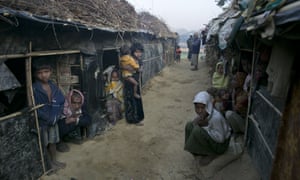
The British foreign secretary, Boris Johnson, will make a delicate visit to Myanmar on Friday to try to press Aung San Suu Kyi to end the persecution of religious minorities and allow aid workers full access to areas of conflict.
The two-day trip, the most high-profile UK visit to the country since David Cameron visited in 2012, is highly sensitive because the British government has been reluctant to blame Myanmar’s de-facto leader and Nobel peace prizewinner for the persecution of the Rohingya people.
A military crackdown in Rakhine province has cast a pall over the government of Aung San Suu Kyi, who spent much of the past two decades under house arrest before winning elections in November 2015 that ended decades of military rule.
Myanmar’s armed forces, the Tatmadaw, retain significant power and Johnson will also be looking to raise the Rohingya issue with the army’s commander-in-chief, Min Aung Hlaing. Under the country’s constitution, which was drafted by the Tatmadaw, the military controls the three most powerful government ministries: home, defence and border affairs.
The UN estimates that 66,000 members of the predominantly Muslim Rohingya community have fled to Bangladesh since October.
Johnson is due to travel to Yangon and the country’s capital, Naypyidaw.
The UK Foreign Office minister Alok Sharma said on Tuesday that the military was largely responsible for the human rights abuses in Rakhine. “Clearly it is the army that is acting in the areas where there are humanitarian issues,” he told the House of Commons.
He said Johnson would be making strong representations while in Myanmar, but refrained from calling for a UN-led inquiry into the persecution of the Rohingya, saying he did not think there was international consensus for such a step.
In a sign of the concern about the conflict, the Organisation of Islamic Cooperation’s special envoy to Myanmar, Syed Hamid Albar, has said the UN should intervene to avoid another Cambodia or Rwanda.
Min Aung Hlaing was defiant this week, saying his troops would continue to engage in military action because leaders of some ethnic armed organisations in the country were narrow-minded” in their approach to peace.
Aung San Suu Kyi, whose National League for Democracy won the 2015 election convincingly, has criticised the Tatmadaw, but her detractors say she has been reluctant to recognise the plight of ethnic minorities.
She is barred by law from the presidency, which is held by her close aide Htin Kyaw. She is the foreign minister and a state counsellor.
In the Commons, MPs from all sides called on Johnson step up the UK government’s criticism of the persecution. A former Foreign Office minister, Sir Hugo Swire, urged it to consider withdrawing any further military training to the Myanmar army.
He also said Johnson should to travel to Sittwe, in Rakhine, to talk to the Rohingya and report back on any evidence that outside forces were stirring up unrest.
Sharma, Swire’s successor, said the Ministry of Defence did not provide combat training, and aid instead focused on English-language tuition and policing in a modern democracy.
The shadow Foreign Office minister Catherine West said she was deeply concerned about a “raft of human rights violations have taken place in recent months, including cases of torture, rape and sexual assault, summary executions and the destruction of mosques and homes.”.
Source by: https://www.theguardian.com



